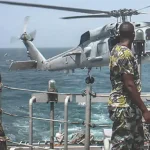Tensions are mounting between Venezuela and the United States after President Nicolás Maduro accused Washington of “fabricating war” following the deployment of the world’s largest warship to waters near Latin America. The move, which comes amid renewed diplomatic strain between the two nations, has sparked global concern over possible military escalation in the region.
Maduro, speaking in a televised national address on Friday night, claimed that the U.S. deployment is part of a larger plot to “destabilize and threaten” Venezuela’s sovereignty. He alleged that Washington is using its military power to intimidate smaller nations and provoke unrest under the pretext of maintaining security in the Americas.
“The United States is fabricating war, not peace,” Maduro declared. “They want to bring conflict to our region, to frighten our people, and to control our resources. But Venezuela will not be intimidated.”
US Deploys Supercarrier amid Regional Tensions
According to reports from U.S. defense officials, the USS Gerald R. Ford, the world’s largest and most advanced aircraft carrier, was deployed as part of a “strategic maritime operation” in the Caribbean Sea. The Pentagon described the mission as a routine move aimed at strengthening regional security and countering transnational threats.
However, Caracas has interpreted the deployment as a direct act of aggression. Venezuelan state media accused Washington of trying to “sow fear” and prepare for potential intervention ahead of upcoming political changes in the country.
Maduro Blasts US ‘Imperialist Tactics’
Maduro’s fiery speech was laced with anti-imperialist rhetoric, a hallmark of his administration’s long-standing conflict with U.S. foreign policy. He accused Washington of hypocrisy — claiming to promote democracy while undermining nations that resist its influence.
“They talk of freedom and human rights,” Maduro said, “but behind those words are warships, sanctions, and threats.”
He further alleged that U.S. intelligence agencies were collaborating with opposition leaders in Venezuela to destabilize his government and create a pretext for military intervention.
The Venezuelan leader vowed to strengthen alliances with countries such as Russia, China, and Iran, saying his government would continue to resist what he called “Western aggression.”
Washington Responds
In response, a spokesperson for the U.S. Department of Defense dismissed Maduro’s accusations as “baseless propaganda,” insisting that the deployment of the USS Gerald R. Ford is “a routine regional mission, not directed at any specific nation.”
“Our commitment to ensuring maritime stability and countering illegal operations in the region remains unchanged,” the statement read.
The U.S. maintains that its operations in Latin America focus on drug trafficking, illegal arms trade, and humanitarian support, but analysts note that the timing of the deployment — amid rising political instability in Venezuela — is unlikely to be coincidental.
Geopolitical Reactions
The development has drawn strong reactions from global observers.
Analysts warn that the move could further strain already fragile relations between Washington and left-leaning Latin American governments.
Russia’s foreign ministry condemned the deployment, calling it a “provocation and display of military arrogance.” China also urged the U.S. to “avoid escalating tensions” and instead engage in diplomatic dialogue.
Meanwhile, regional blocs such as ALBA (Bolivarian Alliance for the Peoples of Our America) have expressed solidarity with Venezuela, accusing the U.S. of “militarizing the Caribbean.”
History of US–Venezuela Tensions
Relations between the two countries have been hostile for over two decades, dating back to the presidency of Hugo Chávez, Maduro’s predecessor. The U.S. has imposed extensive sanctions on Venezuela over alleged human rights abuses and corruption, while Caracas blames Washington for fueling economic instability through political interference.
In recent years, Washington has recognized opposition leader Juan Guaidó as Venezuela’s legitimate president, a move that further deepened diplomatic isolation for Maduro’s regime.
Regional Concerns Mount
Experts warn that the presence of such a powerful U.S. warship in the region could escalate military tensions and embolden opposition groups within Venezuela.
Security think tanks in Latin America have urged restraint, warning that even a small incident at sea could trigger a major diplomatic crisis.
“This is a dangerous time,” said geopolitical analyst María Rodríguez. “The symbolism of the world’s largest warship stationed so close to Venezuela cannot be ignored. It sends a powerful message — one that could destabilize the region further.”
Maduro Calls for Unity and Resistance
In closing his national address, Maduro urged Venezuelans to remain calm but vigilant, calling for national unity against what he described as “imperialist aggression.”
“We will not kneel,” he said. “Our independence was not given to us — we fought for it. And we will defend it again if we must.”
The Venezuelan government has since heightened security along its coastline and placed its armed forces on alert.
As tensions continue to rise, global observers are watching closely to see whether the U.S. deployment leads to renewed diplomatic standoffs — or a potential military confrontation in one of the world’s most politically charged regions.










